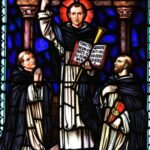St. John the Baptist
St. John the Baptist
St. John the Baptist: A Zealous Prophet in Turbulent Times
When they lived:
St. John the Baptist, a captivating and enigmatic figure, lived during the early 1st century AD.
Where they lived:
He resided in the rugged wilderness of Judea, a land of untamed beauty and spiritual significance.
Notable world events during the time of their life:
- The Roman Empire’s Conquest of Judea (63 BC – 6 AD): During John’s life, Judea was under the dominion of the Roman Empire. This conquest brought both cultural upheaval and economic development to the region, shaping the social landscape in which John would later emerge as a prophet.
- Birth of Jesus Christ (c. 4 BC): Perhaps the most profound event of the era, the birth of Jesus in Bethlehem marked the beginning of Christianity and set the stage for John’s pivotal role as the herald of the Messiah.
- The Great Fire of Rome (64 AD): An infamous blaze that engulfed Rome, destroying much of the city and leading to widespread devastation. This event brought forth accusations against Christians, eventually leading to their persecution, including John’s cousin, Jesus, and the early Christian community.
- The Siege of Jerusalem (70 AD): The Roman forces, under the command of Titus, laid siege to Jerusalem, resulting in the destruction of the Second Temple and reshaping the course of Jewish history. John’s life unfolded in the backdrop of the political and religious tensions that led to this monumental event.
Their patronage:
- Patron Saint of Baptism: As the one who baptized Jesus Christ, St. John’s name became synonymous with this sacred sacrament, symbolizing purification and rebirth.
- Patron Saint of Converts: His teachings and dedication to spiritual renewal inspired many to embrace Christianity, making him the patron saint of those who undergo conversions.
- Patron Saint of Tailors: Interestingly, St. John is also the patron saint of tailors, as it is believed that his humble attire in the wilderness influenced the habits of medieval tailors’ guilds.
- Patron Saint of Protection against Poison: Legend has it that St. John once drank poisoned wine and miraculously survived, bestowing upon him the patronage against poison-related afflictions.
A Son Was Promised
During ancient times, when a king was about to visit a town subjected to his rule, the townspeople prepared for the king’s coming. This was done in order to offer the king a warm welcome to their place. This was precisely the “job” that St. John the Baptist had done.
John the Baptist was the older cousin of Jesus. He was a prophet sent by God to prepare the people for the coming of the promised Redeemer into the world. His birth can be seen in the gospel according to Luke. His father, Zechariah, belonged to the priestly section of Abia. His mother, Elizabeth, was also a direct descendant of Aaron. Both of them lived good lives and were obedient to the law. However, they had no children because they were both advanced in age and Elizabeth was barren.
When their section was assigned to offer incense in the temple, Zechariah was chosen to burn the incense. While the incense was being offered, the angel Gabriel appeared to Zechariah with the news that he and his wife would have a child. This child, the angel continues, would bring “joy and gladness, and many will rejoice at his birth, for he will be great in the sight of [the] Lord. He will drink neither wine nor strong drinks. He will be filled with the Holy Spirit even from his mother’s womb, and he will turn many of the children of Israel to the Lord, their God. He will go before him in the spirit and power of Elijah to turn the hearts of fathers toward children and the disobedient to the understanding of the righteous, to prepare a people fit for the Lord.” (Luke 1:14-17). Adding to this, the angel told him that the child’s name should be “John”.
Zechariah doubted the angel’s message, and for that, he became mute. Soon enough, Elizabeth bore a child. Nine months later, she gave birth to a baby boy. Their relatives were confused when Elizabeth told them that the boy’s name would be “John”. So they asked Zechariah, who asked for something to write on, and he wrote, “John is his name” (Luke 1:63). All were amazed because Zechariah was able to speak again.
The Lord’s Forerunner in Life and in Death
After the account of his birth, John’s early life was untold in the Gospels. Some years later, John began his mission. He preached about repentance for the people’s sins and to “prepare the way of the Lord, make straight his paths” (Luke 3:4). He baptized those who heeded his preaching in the Jordan River. Some of those who had heard him thought that he was the Messiah, to which he replied, “I am not the Messiah” (John 1:20). He baptized Jesus at the inauguration of his mission.
Besides his powerful words about the need for repentance, John also denounced King Herod’s evil act. He was married to Herodias, his brother’s wife. This was a great sin because Herod’s brother was still living. Bearing grudges against John, Herodias demanded that he be arrested. And thus, it happened.
Since then, Herodias has found opportunities to have John killed. One day, Herod hosted a banquet for his friends and guests. Herodias had her daughter dance for Herod. Herod was so overjoyed with the woman’s performance that he promised that he would give anything, even half of his kingdom, to Herodias’ daughter. At Herodias’ bidding, her daughter asked for John the Baptist’s head on a platter. Herod was shocked at the girl’s request, but since he swore before his guests, he dispatched an executioner and had John the Baptist beheaded. Truly, he was Christ’s forerunner in life and in death.
5 Interesting Facts About St. John the Baptist
- St. John the Baptist is the patron saint of Jordan, Puerto Rico, France, Canada, and many other places.
- Aside from Jesus’ and Mary’s birthdays (December 25 and September 8, respectively), the Church also celebrates the birth of St. John the Baptist on June 24. No other saint was given such an honor by the church.
- The church also commemorates St. John the Baptist’s passion or martyrdom on August 29.
- The name “John” is derived from the Hebrew name []dir=”rtl” (Yochanan), which means “Yahweh is gracious”.
- The Church considers St. John the Baptist the last and greatest among the prophets prior to Jesus’ coming.
Prayer to St. John the Baptist
O God, who raised up Saint John the Baptist to make ready a nation fit for Christ the Lord,give your people, we pray,the grace of spiritual joys and direct the hearts of all the faithful into the way of salvation and peace. Through our Lord Jesus Christ, your Son, who lives and reigns with you in the unity of the Holy Spirit, one God, for ever and ever, Amen.



